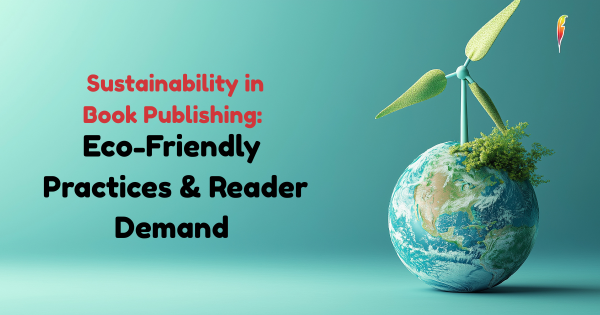.jpg)
A Step-by-Step Guide: How to Utilise Your Author Website
Why is it important for an author to have their own website? An author's website not only serves as an online business card but also as your personal bookshop, press kit, and reader hub all in one.
This blog is a comprehensive guide for authors to build their website for visibility and sales. Detailing how you can turn your author website into a central place for all your work, including books, blogs, news, updates, and relevant links in one place.
Why Your Author Website Matters
An author's website can play a role in your visibility and credibility. Some of the most valuable benefits include:
-
Establishing credibility: When you build a presence on social media and include a link to your website in your posts, readers, media, and event organisers are more likely to visit your page, as it serves as a trusted source of information.
-
Complete control over your brand: Unlike social media, you own your website. You can customise it to look and feel exactly how you want, without the limitations of a social media account. This flexibility helps showcase your work and capture the attention of both readers and media outlets.
-
Improve discoverability: An SEO-optimised website is designed so that search engines like Google can easily understand it and show it higher in search results. This means more people can find you online when they search for topics related to your work. We will discuss SEO-optimisation further later in this blog.
-
A central hub for all your social platforms: You can share content on your social media platforms and include a link directing people to your website, where all your work is easily accessible.
-
Increase your mailing list: A website encourages long-term engagement by building trust, making people more likely to collaborate with you or invite you to events. You can also use it to grow a mailing list, which is a collection of email addresses from people who choose to hear from you so that you can share updates, news, and opportunities directly with them.
What to Put on Your Author Website
Do you want to build your author website, but you’re wondering where to start or what to include? Here are some content ideas to help you achieve your ideal website.
Start with Essential Pages & Content:
-
Homepage: Your homepage is the first thing visitors see, and it is the first impression to attract the audience. In here, you can add your latest book, author tagline, strong call-to-action; a short phrase that tells people exactly what you want them to do next (e.g., buy now, subscribe, contact).
-
About page: This is where you share all that you want people to know about you in a precise and engaging way. Include a professional bio, a clear author photo that reflects you and your book, and any awards and credentials to build relationships and trust.
-
Books & Publications: As an author, this is your ideal space to present your work in the most appealing way. Showcase your book covers, blurbs, links, and reviews.
-
Blog section: Writing blogs from time to time, sharing updates, uploading behind-the-scenes content, and discussing topics relating to your niche is what will make your author website active and engaging for readers.
-
Contact page: Provide an easy way for readers, media, and event organisers to reach you for queries, events or collaborations. If you prefer not to share personal contact details, you can create a dedicated author email address instead.
Bonus Content Ideas:
To develop your author website further, you can add:
-
Exclusive excerpts or short stories.
-
Unseen photos or book notes.
-
Downloadable media kit for journalists.
-
Links to interviews and guest appearances.
Social Addition:
You can utilize posts from Instagram, Facebook, LinkedIn, or X and include Goodreads/Amazon reviews to keep your website authentic, interactive, and up-to-date.
SEO Blogging for Visibility
SEO (Search Engine Optimisation) is the process of setting up your website so search engines like Google can easily read and rank it higher in search results. SEO involves using relevant keywords your audience might search for (e.g., best romance book, fantasy books 2025), writing clear and SEO-optimised titles and descriptions, and making sure your site loads quickly. The better your SEO, the easier it is for people to find you online when they search for topics related to your work.
To boost your author website’s visibility, write SEO-optimized blogs. This helps to improve search rankings and keeps readers coming back. Here are some blog ideas for your author website:
-
Top writing tips
-
Recommended books in your genre
-
Updates on your next book
-
Author event recaps
-
Personal stories that connect with your readership
For further inspiration on author blogging, check out our blogs:
Promote your Author Website
After setting up your author website, it’s time to promote it. For maximum exposure, you can share your site link in:
-
Social media bios and posts
-
Email signatures
-
Guest blog posts
You can also use call-to-action phrases to encourage people to visit your website. Additionally, you can connect with other authors to swap links and create guest content. Keep your site content updated so repeated visitors always find something new.
Submitting Content to the Digital Team
Our published authors can share blog ideas, news and event updates, and promotional content by emailing our Marketing Team. They can provide you with the necessary forms to submit changes, or they can forward your updates to our Digital Team via email. When sending content, make sure it is free of errors and clearly labelled so we can easily understand its purpose.
For images, use high-resolution files (JPEG or PNG) and include captions or image details if you want readers to have additional context. Provide any relevant dates or links to support promotion. The clearer and more complete your submission, the faster it can be uploaded and shared with your audience on your author website. Check out this well-crafted website for our author, Christine Bunn: https://christinebunn.ampbk.com/
Conclusion
Your author website can be one of your most powerful digital marketing tools if you use it efficiently. It can be used to engage readers, share news updates, write blogs, and add promotional material. If your author website is SEO-optimized, it has the chance to gain more visibility and attract new audiences. Include images, events, news, and links to your books or social media on your author website. A well-developed site helps engage readers, showcase your work, and boost your writing career. Don’t wait; build your website, start a blog, share images, and keep your content fresh.
We use cookies on this site to enhance your user experience and for marketing purposes.
By clicking any link on this page you are giving your consent for us to set cookies



